You are viewing the Cultures of Knowledge Blog archive for the ‘Conferences and Workshops’ Category:
Further to the CFP, you can now book for the one-day conference The Permissive Archive (UCL, Friday 9 November 2012). Celebrating the tenth anniversary of the Centre for Editing Lives and Letters, the fascinating-sounding event will ‘present a wide range of work which opens up archives – not only by bringing to light objects and texts that have lain hidden, but by demystifying and demonstrating the skills needed to make new histories’. Rescuing repositories from their persistent but wildly misleading association with neutrality, inertia, and ‘settled dust’, archival research will be ‘championed as engaged and engaging: a rigorous but permissive field’. Flying the flag for Cultures of Knowledge will be our former 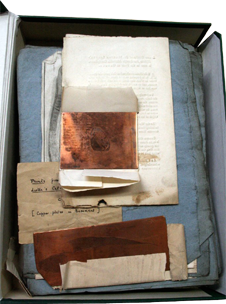 doctoral student Kelsey Jackson Williams (who will present on John Aubrey’s donations to the Ashmolean Museum) and Anna Marie Roos (who, on the same panel, will offer a case study of the complex archival trajectory of four boxes of Martin Lister ephemera [pictured] serendipitously discovered among the holdings of the Sackler Library earlier this year). Other epistolary papers abound.
doctoral student Kelsey Jackson Williams (who will present on John Aubrey’s donations to the Ashmolean Museum) and Anna Marie Roos (who, on the same panel, will offer a case study of the complex archival trajectory of four boxes of Martin Lister ephemera [pictured] serendipitously discovered among the holdings of the Sackler Library earlier this year). Other epistolary papers abound.
The deadline for registrations is 1 November 2012. For further details, the schedule, and to book online, head along to the conference website.
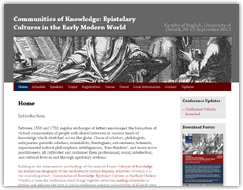 Online booking is now open for Communities of Knowledge: Epistolary Cultures in the Early Modern World, the third and final Project conference, which will take place in the English Faculty, Oxford, on 20-22 September 2012. Organised by Rhodri Lewis and Noel Malcolm, the event brings together seventeen leading authorities to explore and celebrate the ways in which intellectual interests and activities of all kinds were pursued and propagated through correspondence during the long seventeenth century. For provisional programme information, a steadily growing lists of speaker profiles and abstracts, and to book online, please visit the conference website. The deadline for registrations is Friday, 7 September 2012.
Online booking is now open for Communities of Knowledge: Epistolary Cultures in the Early Modern World, the third and final Project conference, which will take place in the English Faculty, Oxford, on 20-22 September 2012. Organised by Rhodri Lewis and Noel Malcolm, the event brings together seventeen leading authorities to explore and celebrate the ways in which intellectual interests and activities of all kinds were pursued and propagated through correspondence during the long seventeenth century. For provisional programme information, a steadily growing lists of speaker profiles and abstracts, and to book online, please visit the conference website. The deadline for registrations is Friday, 7 September 2012.
James Brown
July 17, 2012
Conferences and Workshops, Events, Podcasts, Project Updates
Tags: England, France, John Wallis, Martin Lister, Networks, Pierre Bayle, Pierre des Maizeaux
Convened by Philip Beeley and Martine Pécharman, the workshop is a letter-specific installment of the MFO’s ongoing series Across the Channel: Intellectual Relations between England and France in the Early Modern Period, and will feature epistolary talks from Antony McKenna (on Pierre Bayle), Anna Marie Roos (on Martin Lister), and Ann Thomson and Sébastien Drouin (on Pierre des Maizeaux). The workshop will be held at the Maison, and there’s no need to register; for further details, please visit the workshop webpage.
The neglected theme of epistolary archives – the active collection and curation of letter objects and related papers within various social and institutional ecosystems over broad expanses of time – is close to the heart of Cultures of Knowledge, so we’re delighted to see that friends and colleagues at the Centre for Editing Lives and Letters at QMUL are organizing a fascinating-sounding anniversary conference on The Permissive Archive. To be held at CELL in November 2012, the conference ‘seeks presentations from a wide range of work which opens up archives – not only by bringing to light objects and texts that have lain hidden, but by demystifying and demonstrating the skills needed to make new histories’. Aiming to rescue archives from their persistent but wildly misleading association with neutrality, inertia, and ‘settled dust’, the conference invites proposals (which should cover the period 1500-1800) on definitions of permissive archives; the shape of the archive – ideology and interpretation; the archive which challenges or disrupts; dispersed collections; the archivist and the historian; the ethics and comedy of the archive; order and anarchy; and many more exciting topics.
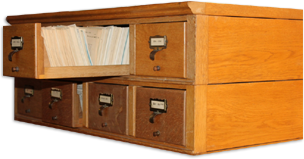 The deadline for 300-word proposals for 25 minute papers is 31 July 2012. For full details and submission instructions, head along to the conference webpage.
The deadline for 300-word proposals for 25 minute papers is 31 July 2012. For full details and submission instructions, head along to the conference webpage.
James Brown
May 22, 2012
Conferences and Workshops, Events, Project Updates, Projects and Centres
Tags: CKCC, Databases, IMPAcT, ImpulsBauhaus, Mapping the Republic of Letters, Networks, Prosopography, The French Book Trade in Enlightenment Europe, Union Catalogue, Union Catalogue News, Visualization, Wikipedia
While Anna Marie was weaving animal magic at the Royal Society, our Technical Director Neil Jefferies and I were headed to the Forzhungszentrum Gotha of the University of Erfurt for an invited workshop on ‘Visualizing Data Resources: The Potential of a Wikimedia Platform for the Digital Humanities’ (27–28 April 2012). Expertly organised by Martin Mulsow, Olaf Simons, and Kristina Petri, and generously funded by Wikimedia Deutschland – the largest and most active of the national chapters – the workshop provided an inspiring forum for a wide range of international participants and projects to share approaches and converge on the question of Wikipedia, the digital humanities, visualizations, and many points in between (see the full description [pdf]).
One set of presentations showcased the Wikimedia community’s own plans for data capture and computational seeing, many of which have great potential for the digital humanities; not always a straightforward relationship, as Olaf discussed in his opening address. These include Wikidata (a collaboratively curated, centralised database of entities designed to support the 280+ language editions of Wikipedia, as well as third-party initiatives, currently under development), and Semantic Mediawiki, an open source extension to Wikipedia capable of (re)organizing the site’s existing content into highly configurable, collectively editable semantic databases. The accumulation and management of structured, actionable (wiki)data within these streamlined platforms will facilitate the creation and deployment of information visualizations across the site’s many interfaces, and by its millions of users in the context of exports and mash-ups.
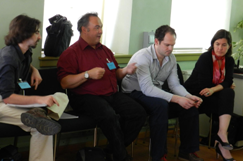
Scott Weingart (Indiana/CKCC), Neil (CofK/Oxford), James (CofK/Oxford), and Nicole Coleman (MRofL/Stanford).
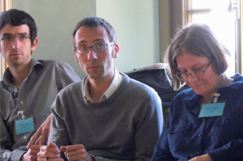
Andreas Wolter (ImpulsBauhaus), Jens Weber (ImpulsBauhaus), and Judith Pfeiffer (IMPAcT/Oxford).
A second cluster of talks focused on the data capture, curation, and visualization techniques and applications being pursued and developed by humanistic projects based in archives, libraries, and universities worldwide. As well as presentations from ourselves and good friends Mapping the Republic of Letters, The French Book Trade in Enlightenment Europe, CKCC, IMPAcT, and Scott Weingart, we heard about (inter alia) linked data and gamification at the University of Colorado; an adaptive, interactive, dynamic historical atlas (AIDA) being created at the University of Erfurt; and the wonderful ImpulsBauhaus initiative based at the the Bauhaus-Universität Weimar. Designed to collect information on and represent the global social networks of the Bauhaus, and led by the designer-developer team Jens Weber and Andreas Wolter in 2009, the project harvested extensive biographical and prospopgraphical data on the movement’s participants and affiliates within a specially designed platform which served as the basis for dynamic network infographics and an interactive three-dimensional table, presented most memorably within an illuminated cube. A video of this extraordinary project opens the post.
James Brown
May 14, 2012
Conferences and Workshops, Events, Exhibitions, Podcasts, Project Updates
Tags: Animals, Conchology, Frogs, History of Medicine, History of Science, Illustration, Insects, Martin Lister, Natural History, Ornithology, Royal Society, Seventeenth Century, Toads
Generously sponsored by the project, The Royal Society, The Wellcome Trust, the John Fell Fund, and the BSHS, sixty-three delegates attended the day-long event, which featured papers from eleven international authorities on early modern science. Speakers discussed everything from the views of French naturalists about the differences between dromedaries and camels, to the chequered history of the publication of the cabinet of natural curiosities of Albertus Seba, to the ornithology of Francis Willughby and John Ray and the scientific representation of frogs and toads.

Helen Watt, our Lhwyd researcher.

Perusing the exhibition.

Anna Marie talks to Jill Lewis.

Early modern ornithologies.
There was a concomitant exhibition in the Royal Society’s Marble Hall, also curated by Anna Marie, featuring a display of relevant books from the Society’s collections; highlights were a bear paw clam displayed alongside its illustration by Lister’s daughters in his Historiae Conchyliorum (1692-97), and John Ray’s Historia Plantarum, in which Ray deployed the terms ‘petal’ and ‘pollen’ for the first time. In a further exciting output, Anna Marie will guest edit a special conference issue of Notes and Records of the Royal Society (December 2012) dedicated to the complex interplay between seventeenth-century medicine and natural history. Dovetailing out from Lister’s own contributions, the special issue will consider to what extent practices and technologies of natural history changed between the Renaissance and the seventeenth century, and will explore how the acquisition of knowledge concerning the natural world and new taxonomies affected the perception and treatment of beasts for medical and experimental use.
 doctoral student Kelsey Jackson Williams (who will present on John Aubrey’s donations to the Ashmolean Museum) and Anna Marie Roos (who, on the same panel, will offer a case study of the complex archival trajectory of four boxes of Martin Lister ephemera [pictured] serendipitously discovered among the holdings of the Sackler Library earlier this year). Other epistolary papers abound.
doctoral student Kelsey Jackson Williams (who will present on John Aubrey’s donations to the Ashmolean Museum) and Anna Marie Roos (who, on the same panel, will offer a case study of the complex archival trajectory of four boxes of Martin Lister ephemera [pictured] serendipitously discovered among the holdings of the Sackler Library earlier this year). Other epistolary papers abound.

 The deadline for 300-word proposals for 25 minute papers is 31 July 2012. For full details and submission instructions, head along to the
The deadline for 300-word proposals for 25 minute papers is 31 July 2012. For full details and submission instructions, head along to the 

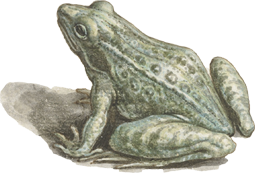 In commemoration of the 300th anniversary of the death of
In commemoration of the 300th anniversary of the death of 




 Join
Join 